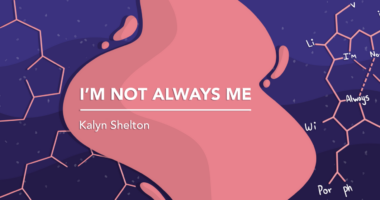Everything Takes Longer With Chronic Illness

I run late. I sleep in. I am a slow processor. I only have so much control over my pain and fatigue day to day, and it’s been like this for years. I am so over feeling guilty about it.
Before chronic illness, I worked full time as a communications professional. I thought of myself as a leader in my community, a supportive sister, daughter, and granddaughter, and a social butterfly. I was a 30-something single woman enjoying life. I bought a condo, I had big plans.
Then, disabling symptoms of untreated acute hepatic porphyria (AHP) attacks turned my world upside down. Suddenly, doctor appointments and constant symptom monitoring consumed my days. To further complicate things, unpredictable levels of pain, brain fog, and fatigue made keeping to a routine nearly impossible.
Welcome to life with chronic illness, where everything takes longer.
***
While brainstorming this column, I spoke with a handful of girlfriends my age, who all live with unique chronic illness challenges. I asked them if they, too, have noticed that everything takes longer. With varying degrees of frustration and shame, they all said the same thing: They have to prioritize daily tasks to honor their bodies. Across the board, the No. 1 thing they let slip was cleaning. They just didn’t have the time or energy left to keep a tidy house.
I can relate. When I feel sick, foggy, and tired, it takes more energy to do even the simplest of everyday things. I run late, and when I do complete tasks, it’s on a symptoms-modified timeline. I coined a name for this issue. I call it: “spoonie time.”
“Spoonie” is a term for the estimated six in 10 U.S. adults with chronic health challenges. It originated from a concept called the “spoon theory,” which explains day-to-day energy limitations using spoons.
The problem with society’s standards of time
Like many, I was brought up to value efficiency and take pride in being busy. I lived in a different version of my body. The shift to managing a disability that affected my every day was jarring, confusing, and frustrating.
I tried every productivity tactic in the book to manage doctor appointments, treatments, and even recovery time. Time blocking my health was as foolish as it sounds. In the end, I felt like a failure. None of it worked because no application, strategy, or book could address the root cause of spoonie time: chronic illness!
Why things take so long
I spend very few days in bed. And yet, more often than not, the sun goes down and I feel as though I have nothing to show for my day.
Managing my illness requires extra tasks, such as additional rest, medications, diet, physical therapy exercises, scans, labs, tests, and checkups with multiple providers. Neglecting anything from that list poses serious consequences.
The mental energy used to manage a chronic illness is real, too. Listen. I don’t love making every single thing about AHP, but I’d be lying if I said it didn’t dictate basically all of my decisions. It’s a constant negotiation between my mind and body, an unending analysis of cause and effect that I attempt to process in the midst of brain fog.
I’ve blown through my body’s red flags in the noble pursuit of productivity too many times. It’s a losing game. Instead, I’ve learned to count my spoons and practice self-compassion. Some days, I can fit in dog walking, weeding the garden, cleaning, and cooking dinner. Other days, I prioritize.
Applying spoonie time
Lately, I’m using spoonie time to strip the shame from how I manage my relationships and household expectations. Spoonie time reminds me I don’t have to stress about a full inbox. I can wait for the fog to clear and a day my energy is better suited for returning phone calls, texting, and emailing. Spoonie time is a helpful boundary, and I’ve learned that people understand.
I also use spoonie time as a reminder that chores can wait. The hair will still be in the sink, and the weeds will still be in the garden. As much as I hate looking at it, I try to let a scuzzy bathroom or an overgrown flower bed serve as symbols of choosing my body over my to-do list.
As spoonies, we’re probably not the most punctual and reliable anymore. Our houses may not be the cleanest. Our health must come first. And that’s OK. Embracing spoonie time is an act of self-compassion.
It’s unfair to judge ourselves on the standards of others, who have drastically different life experiences. But more than that, it’s unkind. Can we reexamine our glorification of productivity and throw away societal standards? Can we accept that things will happen in their own time, as we are mentally and physically able?
***
Note: Porphyria News is strictly a news and information website about the disease. It does not provide medical advice, diagnosis, or treatment. This content is not intended to be a substitute for professional medical advice, diagnosis, or treatment. Always seek the advice of your physician or other qualified health provider with any questions you may have regarding a medical condition. Never disregard professional medical advice or delay in seeking it because of something you have read on this website. The opinions expressed in this column are not those of Porphyria News or its parent company, Bionews, and are intended to spark discussion about issues pertaining to porphyria.








Comments
Gretchen
Thank you, sweet sister, for this article. You have eloquently put into words what I’d like to explain to people but have trouble figuring out how to. I love you!
Claire Richmond
I love you too! And I am always here for you! Thank you for sharing your story and helping me brainstorm.
Jan Schuhmacher
No matter how late you are, you're always worth the wait!
Claire Richmond
Ha! That's right, Jan! So wise.